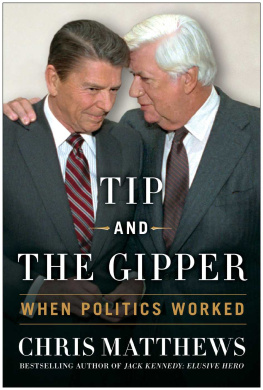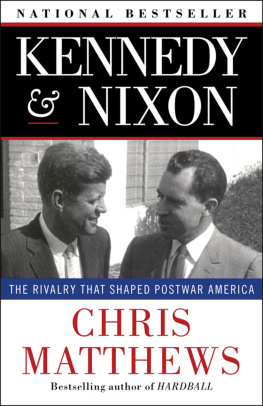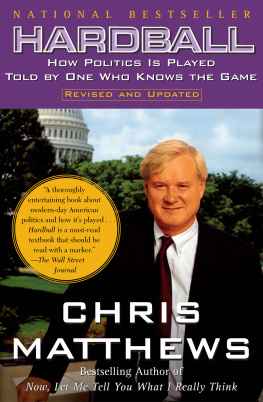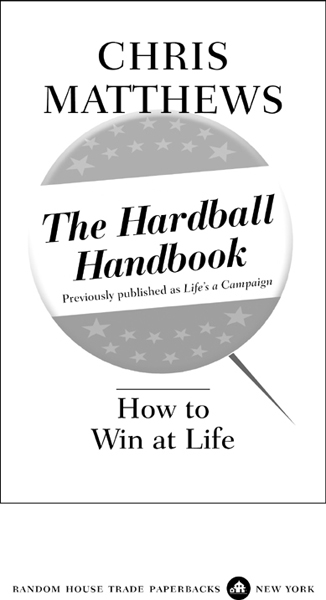Introduction
We live in perilous times. This is a handbook for getting ahead in them. Its got all the know-how Ive collected on Hardball from those successful people Ive spent my life studying.
Case in point: President Barack Obama. He didnt elect himself president. He got to the White House by excelling at the two great challenges of life. One, he persuaded people, millions in his case, to do what he wanted them to do. Two, he got past othersrivals, critics, naysayerswho stood in his path.
The premise of this book is straightforward: To get ahead in life you can learn a lot from those who get ahead for a living. Some of what I am going to tell you in this book is counterintuitive, and some is so obvious youll feel like an idiot for not knowing already. Five nights a week I get to talk with the big shots of our societythe presidential candidates, the chieftains of business, the icons of popular culture. While I try to squeeze the truth out of all of them, the people who make the biggest impression on me and whove really taught me the tricks of getting ahead in life are the politicians. I know that goes against the grain, but so does the shrewdest advice Ive grabbed from these guys.
This book is about success. Its everything Ive learned about life in four decades of dealing up close and personal with the countrys best politicians.
You can say what you want about these masters of power. They get people to vote for them, give money to their campaigns, trust them with their country. They possess this wondrous ability, Ive discovered, to get other people to do just what they want them to do.
How? By knowing things. The best of these politicians have a sure grip on human nature. They leave it to the amateurs to believe how people are supposed to behave. They know the secrets of how people actually do.
They are good listeners. They know the deep human need to be paid attention to. Did you ever try listening? Bill Clinton told a fellow Rhodes scholar when asked his trick for getting the girls. Its the same advice he would give his wife. That listening tour of upstate New York made Hillary a United States senator.
Politicians are shameless when asking for things. Being Machiavellian, they know that the more a person gives to them, the more likely that person is to keep on giving.
Theyre upbeat. Barack Obama wasnt the first president to prove the power of optimism. Before Obama gave us the audacity of hope, Ronald Reagan gave us morning in America. Before him, John F. Kennedy offered people high hopes. Before him, Franklin Roosevelt led us in Happy Days Are Here Again.
I realize that the notion of learning anything of value from politicians cuts against the grain. But what these people can teach us about human nature is priceless: how to get a perfect stranger to like you, help you, root for your success; how to deal with rivals who want the same prize youre chasing; how to build a name for yourself; how to matter; and, for those who want to, how to lead.
This is not a book of political science. I wouldnt trust one that was. The ability to get along with people, life has taught me, is an art. Getting people to do what you want them to, I have further learned, is a fine art.
My business is watching and questioning politicians. I cant tell you how instructive their behavior is. Youve seen me on Hardball in the past twelve years questioning senators, governors, and congressmen. What you havent seen is the four decades Ive devoted to watching and listening to them when they dont think Im doing it. For as long as Ive been around them, Ive been collecting stories from politicians, quietly distilling from them the traits that separate the professional from the amateur. It has equipped me with valuable lessons about life.
Political traits are in essence the ability to deal with people. Im talking about basic likability, the readiness to listen, to project optimism, to ask for help, to display good cheer in the face of opposition. To learn the traits of the best practitioners is to acquire a treasure chest of ways to persuade and influence people.
So much of life is persuasion, getting people to do what we want them to. We want a child to play by the rules, a boss to appreciate us, our colleagues to see our point of view. We want the person we love to love us back. We prefer friends but we end up facing rivals. We have dreams and we want help in realizing them.
Think of John F. Kennedy or Barack Obama, Ronald Reagan or his old rival Speaker Tip ONeill, Nancy Pelosi or Hillary Clinton. To them, making new friends, dealing with opponents, getting out their message, and upholding their credibility comes with the territory. Its called campaigning.
I realize my enthusiasm for what we can learn from politicians may shock people who are used to my grilling these gentlemen and ladies Monday through Friday on Hardball and my dissecting them over the weekend on The Chris Matthews Show. The truth is, my TV guests may or may not have a ready answer to my questions about their partisan behavior. They may or may not be up to snuff on a policy question. But when it comes to pushing their own careers, I can assure you, the best politicians know exactly what theyre doing.
As I said, they see and exploit the way human beings really behave, not the way were supposed to. They understand that we much prefer to be listened to than to be talked at, that while we may not mind being used, we resent deeply being made to feel discarded. Politicians also know that no one, whatever lip service he or she may pay to the proposition, wants a level playing field. Gaining an edge is something everyone tries to do. The politicians advantage is his ability to grasp and exploit such basic truths of human nature.












